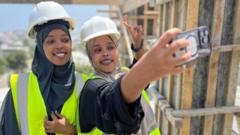In the heart of Somalia's booming construction sector, two young female engineers, Fathi Mohamed Abdi and Saadia Ahmed Omar, are challenging norms and reshaping the skyline of Mogadishu. These trailblazers have been at the forefront of building a 10-floor apartment complex in the Hodan District, symbolizing the city’s rebirth from years of civil unrest.
"People doubted me at first. They questioned my capabilities just because I was a woman," shares 24-year-old Abdi, chief operating officer of Arkan Engineering Services. Over the past five years, she and her colleague have navigated a male-dominated field, driven by a passion to rebuild their war-torn hometown, which still bears the scars of its violent past.
Growing up amid chaos, both Abdi and Omar decided to stay in Somalia, resisting the allure of a safer life abroad. "We are needed in Mogadishu," Omar states, noting that the demand for skilled labor has opened doors previously closed to women in engineering.
The city itself is undergoing significant change, with over 6,000 new structures emerging amid improved security conditions, marking a shift toward modernization. However, this rapid development raises concerns among experts about safety standards and architectural integrity. Architect Siidow Cabdulle Boolaay has criticized the loss of Mogadishu’s historical architecture and warns about the potential dangers of using local sand for construction, which carries a high salt content detrimental to building stability.
Yet, momentum continues to build, supported by increasing diaspora investments and a burgeoning awareness that empowering women engineers is essential to meeting the workforce demands. Ibrahim Abdi Heyle of the Somali Engineers Association points out that women's inclusion brings innovative perspectives that are crucial in tackling the challenges ahead.
Despite their successes, Abdi and Omar face daunting obstacles—female engineers constitute a mere 5% of the profession in Somalia, and mentorship opportunities are scarce. Omar recalls facing numerous rejections for internships, having to persist for months before securing a chance to prove herself in the field.
As they climb the ranks, both women take immense pride in their contributions to the city. "This is a new Mogadishu, one that embodies our hopes and dreams," Abdi claims. The vision lies in transforming Mogadishu into a modern city, serving as a model for post-conflict reconstruction and resilience.
The ongoing challenge of urbanization comes with complexities, particularly in infrastructure management, highlighting the need for a coordinated approach to water and sewage solutions. The government’s collaboration with international organizations aims to implement critical systems and regulations, although concerns about the potential displacement of residents loom large.
Despite the concurrent threats of violence from insurgent groups like al-Shabab, the resolve among Mogadishu's engineers remains unshaken. They are committed to rebuilding their city, exemplifying hope and resilience in a landscape plagued by adversity. "We're not just constructing buildings; we're constructing hope," asserts Omar, a sentiment echoed by her colleague who emphasizes their role in paving a future where women lead in traditionally male spheres.
The aspirations for Mogadishu extend beyond mere aesthetics; they serve as a foundation for a renewed identity, fostering a city that stands resilient amidst its challenges while aiming for a stable and prosperous future.
"People doubted me at first. They questioned my capabilities just because I was a woman," shares 24-year-old Abdi, chief operating officer of Arkan Engineering Services. Over the past five years, she and her colleague have navigated a male-dominated field, driven by a passion to rebuild their war-torn hometown, which still bears the scars of its violent past.
Growing up amid chaos, both Abdi and Omar decided to stay in Somalia, resisting the allure of a safer life abroad. "We are needed in Mogadishu," Omar states, noting that the demand for skilled labor has opened doors previously closed to women in engineering.
The city itself is undergoing significant change, with over 6,000 new structures emerging amid improved security conditions, marking a shift toward modernization. However, this rapid development raises concerns among experts about safety standards and architectural integrity. Architect Siidow Cabdulle Boolaay has criticized the loss of Mogadishu’s historical architecture and warns about the potential dangers of using local sand for construction, which carries a high salt content detrimental to building stability.
Yet, momentum continues to build, supported by increasing diaspora investments and a burgeoning awareness that empowering women engineers is essential to meeting the workforce demands. Ibrahim Abdi Heyle of the Somali Engineers Association points out that women's inclusion brings innovative perspectives that are crucial in tackling the challenges ahead.
Despite their successes, Abdi and Omar face daunting obstacles—female engineers constitute a mere 5% of the profession in Somalia, and mentorship opportunities are scarce. Omar recalls facing numerous rejections for internships, having to persist for months before securing a chance to prove herself in the field.
As they climb the ranks, both women take immense pride in their contributions to the city. "This is a new Mogadishu, one that embodies our hopes and dreams," Abdi claims. The vision lies in transforming Mogadishu into a modern city, serving as a model for post-conflict reconstruction and resilience.
The ongoing challenge of urbanization comes with complexities, particularly in infrastructure management, highlighting the need for a coordinated approach to water and sewage solutions. The government’s collaboration with international organizations aims to implement critical systems and regulations, although concerns about the potential displacement of residents loom large.
Despite the concurrent threats of violence from insurgent groups like al-Shabab, the resolve among Mogadishu's engineers remains unshaken. They are committed to rebuilding their city, exemplifying hope and resilience in a landscape plagued by adversity. "We're not just constructing buildings; we're constructing hope," asserts Omar, a sentiment echoed by her colleague who emphasizes their role in paving a future where women lead in traditionally male spheres.
The aspirations for Mogadishu extend beyond mere aesthetics; they serve as a foundation for a renewed identity, fostering a city that stands resilient amidst its challenges while aiming for a stable and prosperous future.




















